Items filtered by date: October 2024
What Is Gout?
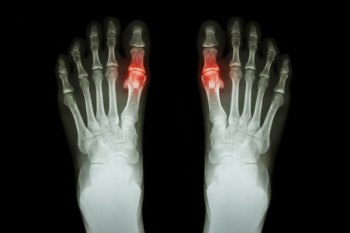
Gout is a form of inflammatory arthritis caused by the buildup of uric acid crystals in the joints, often affecting the big toe. It typically appears suddenly, with symptoms such as intense pain, swelling, redness, and warmth in the affected area. Gout attacks can be triggered by certain foods, excessive alcohol, dehydration, or medications. While lifestyle changes, such as dietary adjustments and increased hydration, can help manage mild cases, recurrent or severe attacks may require medical intervention. If you experience debilitating pain or swelling in the big toe that does not improve on its own, it is important to see a podiatrist. This type of doctor may prescribe medications to lower uric acid levels or reduce inflammation, helping to prevent future flare-ups. If you have or suspect you have gout, it is suggested you schedule an appointment with a podiatrist for a comprehensive evaluation and effective treatment options tailored to your needs.
Gout is a painful condition that can be treated. If you are seeking treatment, contact one of our podiatrists from Nola Sole Podiatry. Our doctors will treat your foot and ankle needs.
What Is Gout?
Gout is a form of arthritis that is characterized by sudden, severe attacks of pain, redness, and tenderness in the joints. The condition usually affects the joint at the base of the big toe. A gout attack can occur at any random time, such as the middle of the night while you are asleep.
Symptoms
- Intense Joint Pain - Usually around the large joint of your big toe, and it most severe within the first four to twelve hours
- Lingering Discomfort - Joint discomfort may last from a few days to a few weeks
- Inflammation and Redness -Affected joints may become swollen, tender, warm and red
- Limited Range of Motion - May experience a decrease in joint mobility
Risk Factors
- Genetics - If family members have gout, you’re more likely to have it
- Medications - Diuretic medications can raise uric acid levels
- Gender/Age - Gout is more common in men until the age of 60. It is believed that estrogen protects women until that point
- Diet - Eating red meat and shellfish increases your risk
- Alcohol - Having more than two alcoholic drinks per day increases your risk
- Obesity - Obese people are at a higher risk for gout
Prior to visiting your podiatrist to receive treatment for gout, there are a few things you should do beforehand. If you have gout you should write down your symptoms--including when they started and how often you experience them, important medical information you may have, and any questions you may have. Writing down these three things will help your podiatrist in assessing your specific situation so that he or she may provide the best route of treatment for you.
If you have any questions, please feel free to contact our office located in New Orleans, LA . We offer the newest diagnostic and treatment technologies for all your foot care needs.
Ankle Injuries and Grades
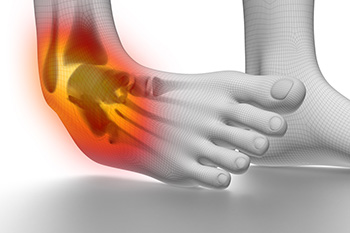
Ankle sprains are common injuries that occur when the ligaments supporting the ankle stretch or tear. One of the most prevalent types is the inversion sprain, which happens when the foot rolls inward, often leading to damage on the outer side of the ankle. Medial ankle sprains, though less common, occur when the foot rolls outward, affecting the ligaments on the inner side. High ankle sprains involve injury to the ligaments connecting the tibia and fibula, usually resulting from a twisting injury. Ankle sprains are typically classified into three grades. Grade one involves mild stretching, grade two indicates partial tearing, and grade three signifies a complete tear of the ligament. If you have sprained your ankle, it is suggested that you promptly contact a podiatrist who can identify which kind of sprain it is, and offer appropriate treatment solutions.
Although ankle sprains are common, they aren’t always minor injuries. If you need your ankle injury looked at, contact one of our podiatrists from Nola Sole Podiatry. Our doctors can provide the care you need to keep you pain-free and on your feet.
How Does an Ankle Sprain Occur?
Ankle sprains are the result of a tear in the ligaments within the ankle. These injuries may happen when you make a rapid shifting movement while your foot is planted. A less common way to sprain your ankle is when your ankle rolls inward while your foot turns outward.
What Are the Symptoms?
- Pain at the sight of the tear
- Bruising/Swelling
- Ankle area is tender to touch
- In severe cases, may hear/feel something tear
- Skin discoloration
Preventing a Sprain
- Wearing appropriate shoes for the occasion
- Stretching before exercises and sports
- Knowing your limits
Treatment of a Sprain
In many cases, the RICE method (Rest, Ice, Compression, and Elevate) is used to treat ankle sprains. However, you should see a podiatrist to see which treatment option would work best with your injury. In severe cases, surgery may be required.
It is important to ask your doctor about rehab options after you receive treatment for your injury. Stretching, strength training, and balance exercises may help the ankle heal while also preventing further injury.
If you have any questions, please feel free to contact our office located in New Orleans, LA . We offer the newest diagnostic and treatment technologies for all your foot care needs.
We Can Treat Your Foot or Ankle Pain
Bunions and Accompanying Symptoms
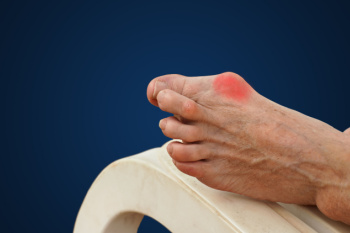
Bunions are painful bony bumps that develop at the base of the big toe, often causing discomfort and affecting daily activities. Common symptoms include swelling, redness, and a noticeable protrusion on the side of the foot. You may also experience stiffness in the big toe, making it difficult to wear certain shoes or walk comfortably. Treatment for bunions often begins with wearing properly fitting shoes with a wide toe box that can help reduce pressure on the bunion. Padding or custom orthotic inserts can provide additional support and alleviate pain. If conservative treatment fails, surgery may be considered to realign the toe and remove the bunion. It is important to address bunions early to prevent worsening symptoms. If you are experiencing bunion pain, it is suggested that you schedule an appointment with a podiatrist. This type of doctor can evaluate your condition and recommend a tailored treatment plan to restore your comfort and mobility.
If you are suffering from bunions, contact one of our podiatrists of Nola Sole Podiatry. Our doctors can provide the care you need to keep you pain-free and on your feet.
What Is a Bunion?
A bunion is formed of swollen tissue or an enlargement of boney growth, usually located at the base joint of the toe that connects to the foot. The swelling occurs due to the bones in the big toe shifting inward, which impacts the other toes of the foot. This causes the area around the base of the big toe to become inflamed and painful.
Why Do Bunions Form?
Genetics – Susceptibility to bunions are often hereditary
Stress on the feet – Poorly fitted and uncomfortable footwear that places stress on feet, such as heels, can worsen existing bunions
How Are Bunions Diagnosed?
Doctors often perform two tests – blood tests and x-rays – when trying to diagnose bunions, especially in the early stages of development. Blood tests help determine if the foot pain is being caused by something else, such as arthritis, while x-rays provide a clear picture of your bone structure to your doctor.
How Are Bunions Treated?
- Refrain from wearing heels or similar shoes that cause discomfort
- Select wider shoes that can provide more comfort and reduce pain
- Anti-inflammatory and pain management drugs
- Orthotics or foot inserts
- Surgery
If you have any questions, please feel free to contact our office located in New Orleans, LA . We offer the newest diagnostic and treatment technologies for all your foot care needs.
Understanding Reasons for Foot and Ankle Swelling
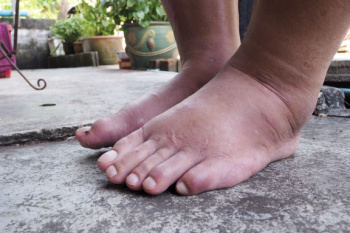
Foot and ankle swelling, or edema, can result from various causes, often indicating underlying health issues. Commonly, swelling occurs due to prolonged standing or sitting, which impedes blood circulation and leads to fluid accumulation. Injury or trauma to the foot or ankle, such as sprains or fractures, can also cause localized swelling. Medical conditions like heart disease or kidney problems can disrupt fluid balance, leading to generalized edema. Additionally, conditions like arthritis and venous insufficiency, where veins struggle to return blood to the heart, contribute to swelling. Certain medications may also cause fluid retention as a side effect. Identifying the root cause of foot and ankle swelling is essential for proper treatment and management. If your feet or ankles have become swollen, it is suggested that you consult a podiatrist who can determine the cause and offer effective relief solutions.
Swollen feet can be a sign of an underlying condition. If you have any concerns, contact one of our podiatrists of Nola Sole Podiatry. Our doctors can provide the care you need to keep you pain-free and on your feet.
Swollen feet are a common ailment among pregnant women and people who stand or sit for extended periods. Aging may increase the possibility of swollen feet and patients who are obese often notice when their feet are swelling too. There may be medical reasons why swollen feet occur:
- Phlebitis - A condition that causes the veins to become inflamed and can also cause leg pain.
- Liver disease - This may lead to low blood levels of albumin which is a protein. This can cause fluid in the blood to pass into the tissues and several areas of the body can become swollen.
- Heart failure - When the heart doesn’t pump properly the blood that is normally pumped back to the heart can pool in the veins of the legs causing swollen feet.
- Kidney disease - One of the main functions of the kidneys is releasing excess fluid in the body. This type of condition can make it difficult for the kidneys to function properly, and as a result the feet may become swollen.
- Deep-vein thrombosis (DVT)- This is a serious condition where blood clots form in the veins of the legs. They can block the return of blood from the legs to the heart which may cause the feet to swell. It is important to be treated by a podiatrist if this condition is present.
Swollen feet can also be caused by bone and tendon conditions, including fractures, arthritis, and tendinitis. Additionally, there may be skin and toenail conditions and an infection may cause the feet to swell. Patients who take medicine to treat high blood pressure may be prone to getting swollen feet.
Many patients elevate their feet to help relieve the swelling and this is generally a temporary remedy. When a podiatrist is consulted the reason behind the swelling can be uncovered and subsequently treated.
If you have any questions please feel free to contact our office located in New Orleans, LA . We offer the newest diagnostic tools and technology to treat your foot and ankle needs.
Fabry Disease and the Feet
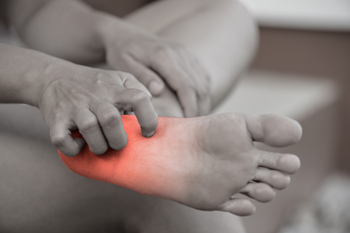
Fabry disease is a rare genetic disorder caused by the buildup of a fat-like substance called globotriaosylceramide due to a deficiency of the enzyme alpha-galactosidase A. This buildup affects various parts of the body, including the heart, kidneys, nervous system, and skin. In terms of foot involvement, Fabry disease can cause burning pain, tingling, and numbness, primarily due to nerve damage, or neuropathy in the feet. This discomfort often becomes worse by physical activity or heat. Diagnosis involves blood tests to measure enzyme levels, genetic testing to confirm mutations, and tissue biopsies to detect GL-3 accumulation. Early diagnosis is imperative as symptoms can progress. If you have foot discomfort or neuropathy, it is strongly suggested that you schedule an appointment with a podiatrist for a proper diagnosis and treatment to help relieve symptoms.
When dealing with systemic disease of the feet, it is extremely important to check the affected areas routinely so that any additional problems are caught quickly. If you have any concerns about your feet and ankles contact one of our podiatrists from Nola Sole Podiatry. Our doctors will assist you with all of your podiatric needs.
Systemic Diseases of the Feet
Systemic diseases affect the whole body, and symptoms usually are displayed in the feet. This condition can make a patient’s ability to walk unbearable. Systemic diseases include gout, diabetes mellitus, neurological disorders, and arthritis.
Gout – is caused by an excess of uric acid in the body. Common symptoms include pain, inflammation, and redness at the metatarsal/phalangeal joint of the base big toe. Gout can be treated by NSAIDs to relieve pain and inflammation, and other drugs that lower the acid levels in the body.
Diabetes mellitus – is an increase in the level of blood sugar that the body cannot counteract with its own insulin. Failure to produce enough insulin is a factor in Diabetes.
Diabetes of the Feet
Diabetic Neuropathy – may lead to damaged nerves and affect the feet through numbness and loss of sensation.
Peripheral Vascular Disease – can restrict the blood flow to the feet, and often times lead to amputation of the feet.
If you have any questions please feel free to contact our office located in New Orleans, LA . We offer the newest diagnostic and treatment technologies for all your foot and ankle needs.

